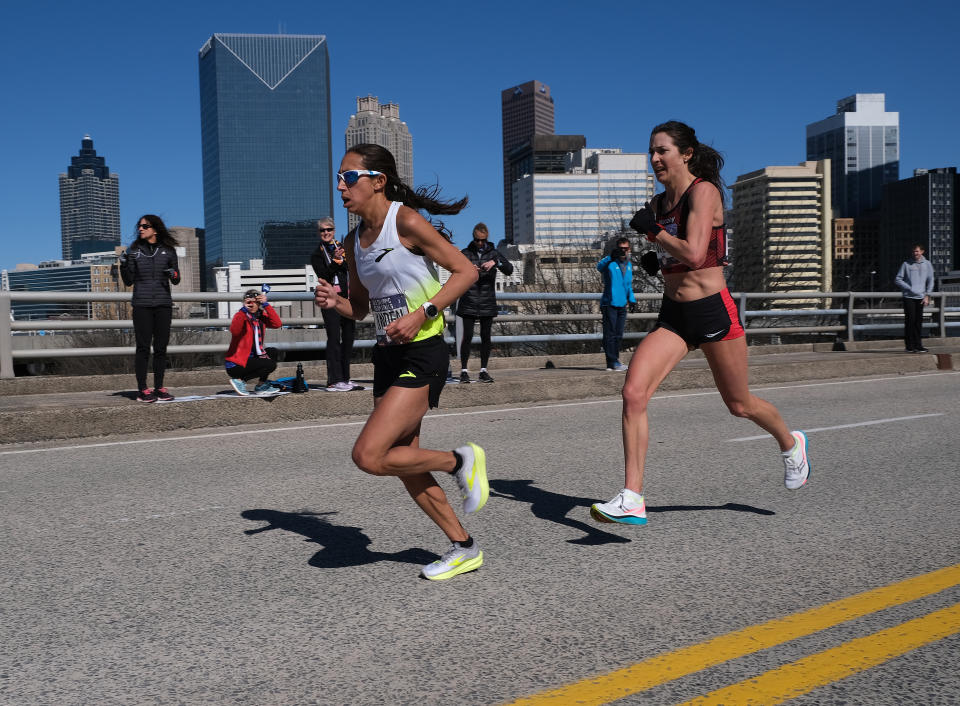Should those who already qualified for the 2020 Olympics have to qualify again? A fourth-place finisher says 'no'
She was 11 seconds away. A few dozen yards down a spectator-lined Atlanta road. For hours, and months and years, Des Linden had trained; worked; struggled; hoped; dreamed. Then, two hours, 29 minutes and three seconds after she began running underneath a shining February sun, everything vanished. She would soon cross the finish line fourth at U.S. marathon trials. Only the top three would qualify for the 2020 Olympics.
“And when you see third cross in front of you,” Linden says, “you go, ‘OK, I can stop dreaming about that.’ ”
Over the coming weeks, though, the coronavirus spread. Uncertainty spread with it. Tokyo 2020 became endangered. On Tuesday, the Games were postponed. And fans wondered: Should trials be re-run?
Is a February 2020 competition the best way to select medal contenders for July 2021?
Should Linden and her fellow runners-up get another shot next winter?
USA Track and Field, along with hundreds of governing bodies worldwide, has decisions to make. Linden, however, doesn’t “even think the federation would entertain that idea.” Athletes, she says, “would push back.” And Linden – one of the many whose dream would be rekindled – would lead the resistance.
Would she even run at a redo?
“Oh, no,” she says without hesitation. “I would fight for those [who qualified].”

‘Let’s not even start that conversation’
When Linden crossed the finish line in Atlanta, the celebration was already underway. One hundred seconds earlier, Aliphine Tuliamuk had raised her fists in exhausted elation. Molly Seidel followed in second, and the two embraced, American flags in hand, their drained bodies supporting each other and surging with emotion. A minute later, Sally Kipyego glided down the final straightaway to join them – at the finish, and in Tokyo. She keeled over with a smile on her face.
Eleven seconds later, Linden crossed and looked around.
She saw Tuliamuk, one of 32 siblings, the first person from her Kenyan village to graduate college. She’d spent two recent years in the buildup to 2020 sidelined by injury, driving for Uber and crocheting. Now, at age 30, she was an Olympian.
Linden saw Seidel, a 25-year-old who’d just run her first marathon, ever. She’d overcome an eating disorder. She’d worked at a coffee shop and as a babysitter to make ends meet. She, too, was now an Olympian.
Linden saw Kipyego, a 34-year-old mom who came to the United States from Kenya to run in college. She represented her native country at the 2012 Olympics. In 2019, two years after giving birth to a daughter, she became eligible to represent the U.S. Now she was an American Olympian.
And Linden, as a two-time Olympian herself, knew what she was missing. “You want that for yourself, because it’s hugging your friends and family, validating four years of work,” she says. “Having done it, you’re like, ‘Oh, that’s so special, I wish I were on that side.’ ”
She also, however, clapped and smiled. She hugged the winners. Because she was “super happy” they got to experience that victorious side as well.
It’s those moments, those feelings, that were on her mind Tuesday when postponement was announced. Some fans, she says, with a trials redo in mind, have wondered: You might get another shot. This is cool, right?
“No,” she says. “Let’s not even start that conversation.”
“They” – the three qualifiers – “should be thrilled and only excited right now.”
The past two weeks have been weeks of uncertainty, fear, perhaps anxiety for hundreds of athletes. Postponement, for many, has brought relief. The last thing already-qualified Olympians need is a threat that their accomplishments could be undone, their joyous steps forcibly retraced, the moments they’d strived for erased.
“To have that chatter, in a time when you just want something certain to look forward to, is just unfair for them,” Linden says.
‘What about our best team?’
The chatter, Linden realizes, is well-intentioned. And with postponement now official, she knows it could crescendo, not just in her sport but in others. “What about our best team?” she anticipates outsiders asking. “What about our best team?”
That, however, is not the point. In theory, it’s what Olympic trials are designed to select, but not in practice.
“We have so much depth that [the race] could look totally different if they had run it [a day later] on March 1st, 2020, without wind, or a few degrees [difference],” Linden explains. “The ifs, ands and buts could go on forever. And that’s the beauty of the trials. It’s final on that day.”
She felt that finality last month. She accepted it and moved forward, processing her disappointment just as the winners processed their achievements. As an athlete, she feels, walking that back isn’t right. The race has been run. It can’t be un-run.
“For those guys, having that on their résumé, ‘Olympian,’ is huge,” she says. “To take that away from them would be a big financial blow as well.”
“Our process is so great,” Linden concludes. “The Olympic trials is self-selecting. We know what the date is. We’ve known that for several years. You have to be at your best on February 29, 2020. It has nothing to do with being prepared [for Tokyo]. Like, this isn’t the optimal date for 2020 Olympics. It’s just the date. It’s not the perfect timetable. It’s the perfect process. And that shouldn’t change no matter where the Games land.”
More from Yahoo Sports:

 Yahoo Finance
Yahoo Finance 

